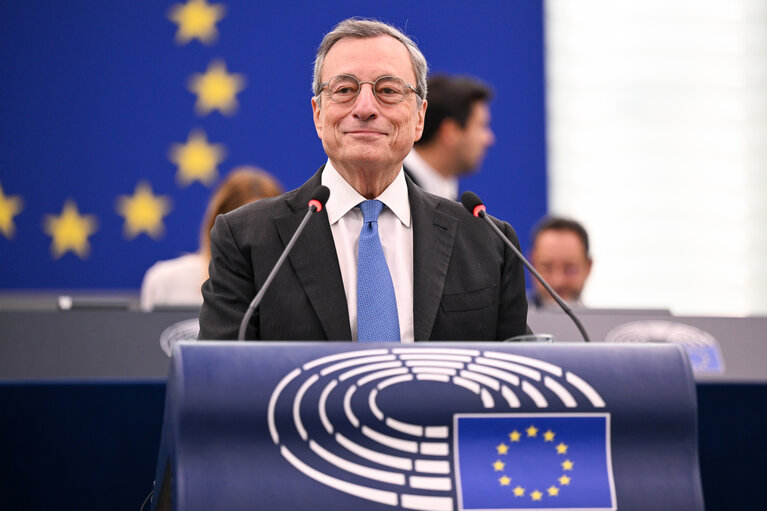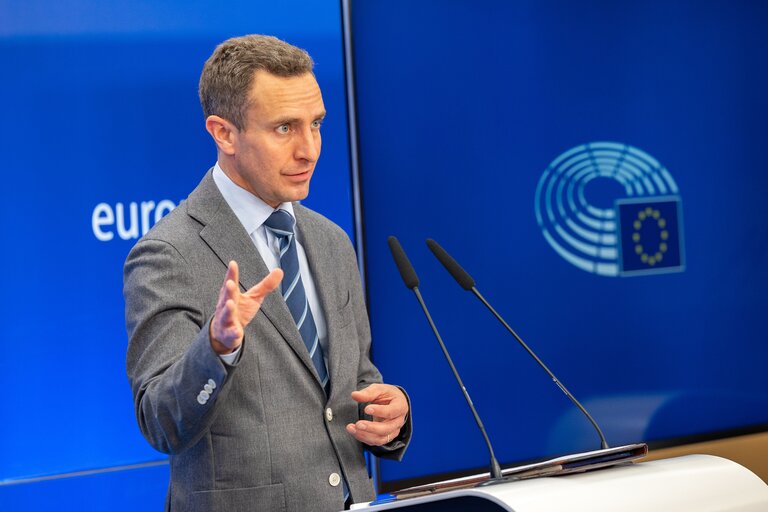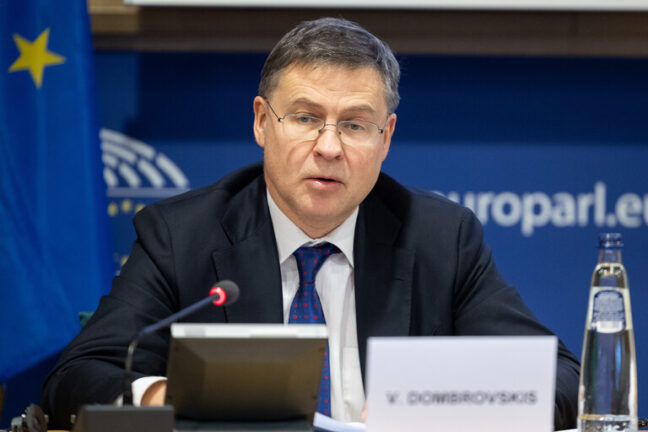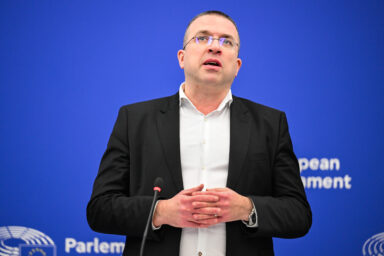On Monday 14 April the European Council gave the green light to the so-called ‘stop-the-clock’ directives—the first step in a broader effort to ease regulatory pressure on European businesses. The move follows the European Parliament’s approval earlier this month and delays the implementation of both the Corporate Sustainability Reporting Directive (CSRD) and the Corporate Sustainability Due Diligence Directive (CSDDD), while significantly narrowing their scope.
The aim, according to Latvian Commissioner Valdis Dombrovskis (Economy and Productivity; Implementation and Simplification), is to offer companies much-needed “breathing space”. But critics warn that the rollback risks eroding hard-won progress on the EU’s green transition and human rights protections.
Rollback
Once celebrated as flagship initiatives of the European Green Deal, the CSRD and CSDDD were designed to compel companies to investigate, report on, and mitigate environmental and human rights risks throughout their global supply chains. In other words, they were intended to prevent European firms from ignoring human rights abuses and environmentally unsustainable practices outside the EU’s borders.
Now, both directives are being scaled back—not only in terms of timelines, but also regarding the number of companies affected and the stringency of reporting obligations.
The CSRD, in force since 2023, was initially expected to apply to nearly 50,000 companies. Under the revised framework, the number drops sharply to around 10,000, effectively exempting 80 per cent of EU companies from mandatory sustainability reporting. The new threshold requires firms to have at least 1,000 employees and meet just one financial criterion, either €50m in turnover, or €25m in assets. Companies falling outside this scope will be allowed to report on a voluntary basis.
You might be interested

Meanwhile, large companies not yet subject to CSRD reporting requirements, as well as the small- and medium-sized enterprises (SMEs) that were due to start reporting later, will now benefit from a two-year delay. The Commission has also pledged to simplify the European Sustainability Reporting Standards (ESRS), currently considered too complex by many businesses.
The CSDDD, which obliges companies to identify and address human rights and environmental abuses in their supply chains, faces similar delays and dilution. The deadline for implementation has been postponed by a year, and instead of annual disclosures, companies will now be required to report only once every five years. The scope of the required information has also been reduced.
Further, EU-wide rules on civil liability have been scrapped. This means member states will no longer be obligated to allow trade unions or NGOs to bring claims on behalf of victims. Instead, national laws will govern whether civil liability provisions apply in cross-border cases, a shift critics say weakens access to justice.
Business First
The rollback forms part of a wider “Omnibus” legislative package aimed at reducing regulatory burdens, drawing inspiration from a recent report by former Italian Prime Minister Mario Draghi on European competitiveness. In his assessment, Draghi cautioned that excessive regulation was stifling innovation and disproportionately affecting SMEs. While emphasizing the need for smarter regulation, he insisted that the EU’s digital and green transitions must remain on track.
“Countries like France and Germany—home to high-impact sectors such as automotive and energy—have been among the most vocal advocates for the reforms, viewing them as a strategic necessity. They argue that without a downscaling of the requirements, domestic industries would face disproportionate regulatory burdens, leaving them at a competitive disadvantage compared to global rivals like the United States and China.”
The center-right European People’s Party (EPP), which initiated the fast-tracking of the stop-the-clock proposal, sees the Omnibus package as crucial to Europe’s economic health. Swedish MEP and EPP vice-chair Thomas Tobé stated: “Europeans expect us to protect their jobs. A growing European economy is the best climate policy we could have. Taking down the economy is counterproductive.” Addressing his counterparts on the left, he asked: “Will you stand for growth and jobs, or for red tape and bureaucracy?”

Dutch MEP Jeannette Baljeu (Renew) echoed this sentiment, supporting the push to reduce administrative hurdles: “We need to give entrepreneurs the confidence that they won’t get stuck in endless procedures. The Commission’s plan to cut red tape by at least 25 per cent—and by 35 per cent for SMEs—is a step in the right direction. But it’s not just about fewer rules. It’s about smarter rules—clear, workable ones, so entrepreneurs can actually get to work.”
Baljeu also highlighted the persistent regulatory fragmentation across the EU: “A product approved in the Netherlands often has to go through the same procedures again in other member states before entering their markets. This doesn’t just cause delays — it discourages cross-border expansion and stifles growth.”
Outside the political arena, businesses have also welcomed the reforms. Europêche, the association representing national fishing enterprises, called the move “a significant first step towards addressing longstanding concerns over regulatory complexity and administrative burdens”.
Pushback from Civil Society
Opposition to the rollback has been fierce. During the Strasbourg vote earlier this month, French MEP Manon Aubry (The Left) called the package a “scandal” and a “gift to large companies”, accusing the EU of enabling multinationals to continue the “massacre of people and planet”.
Civil society organizations and trade unions have expressed similar concerns. In February, activists—including members of the European Transport Workers’ Federation—staged a protest outside the European Commission’s Berlaymont building. Dressed as corporate lobbyists, they accused the EU of bowing to pressure from business interests such as BusinessEurope and the American Chamber of Commerce. The protest also denounced the opaque process behind the package’s wording, warning that it allowed for excessive industry influence.
Belgian MEP Ruben Kennes, formerly of the Workers’ Party and now sitting as an independent with The Left, joined the protest. “Omnibus will do nothing but dilute sustainability standards and enhance deregulation,” Kennes posted on X. “We will fight deregulation and stand up for worker protections.”
Philippe Dam, EU Director at Human Rights Watch, echoed this criticism: “The EU sides with giant corporations rather than victims of corporate abuse. Under the pretense of ‘simplification’, Ursula von der Leyen is gutting the EU’s own achievements on corporate accountability and principled leadership in advancing sustainable economies.”
Dutch MEP Lara Wolters, who served as rapporteur on the CSDDD, argued that the rollback will hurt both the environment and businesses that have already invested in sustainability compliance. “Make no mistake—this is regulatory schizophrenia that’s going to end up increasing compliance costs. Companies have already invested in sustainability, and now the Commission is pulling the rug out from under their feet.”
The World Economic Forum has also voiced concern, warning that the changes could reduce transparency and lead to market inefficiencies. The tension between enhancing competitiveness and maintaining long-term sustainability, the Forum notes, remains one of the EU’s greatest policy challenges.
Still in Flux
While the ‘stop-the-clock’ directive has now been formally approved, the broader Omnibus package—which includes proposed revisions to the EU Taxonomy and the Carbon Border Adjustment Mechanism (CBAM)—remains under negotiation.
After the Commission presented the full package in late February, Parliament fast-tracked parts of it through an urgent procedure in March. But further votes are expected in the coming months, and civil society groups are now pushing for greater transparency and the restoration of original thresholds — especially for large companies.











